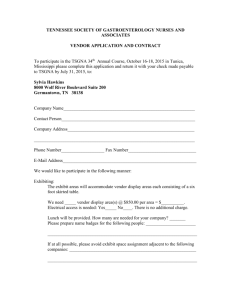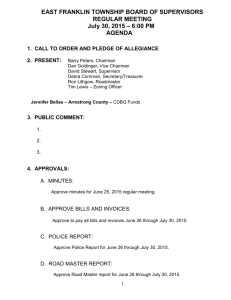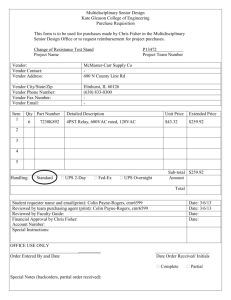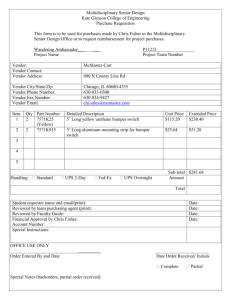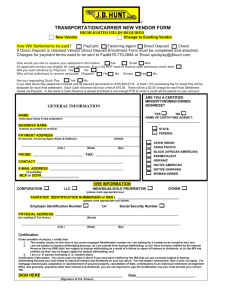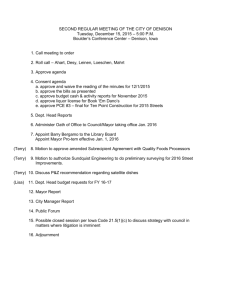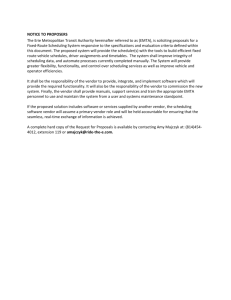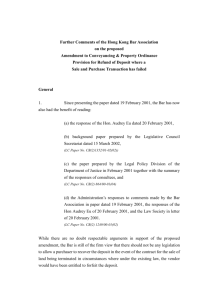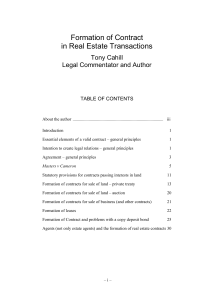Internal Controls: Who's Minding Your Store
advertisement
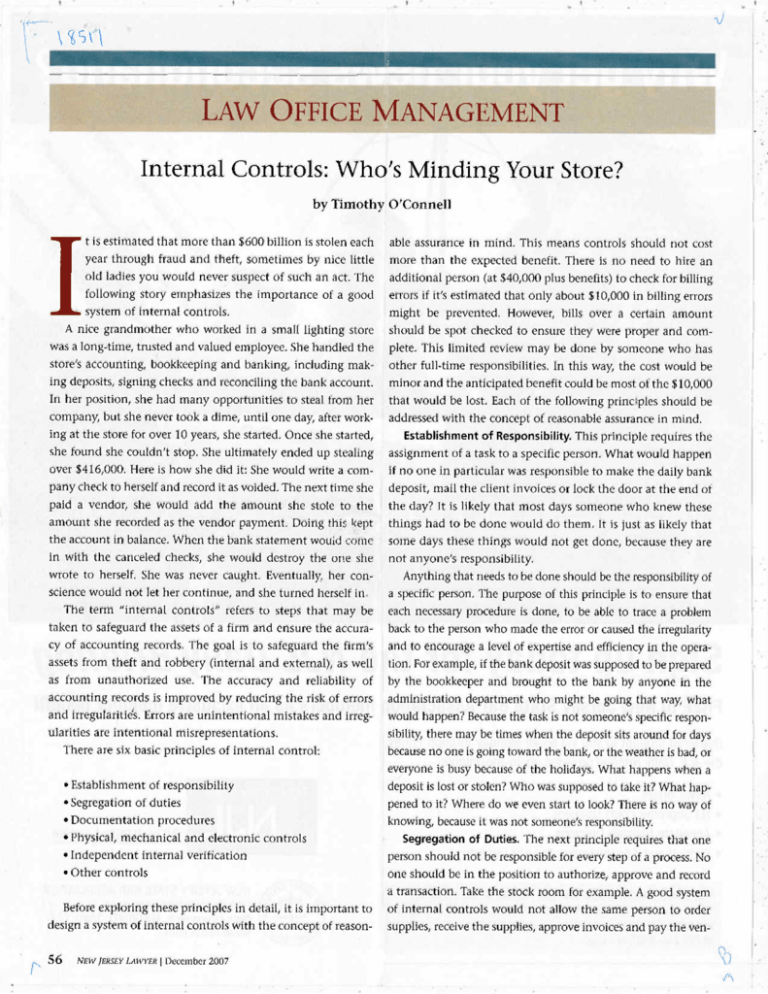
v y~ \ iS\Î LAW OFFICE MANAGEMENT I Internal Controls: Who's Minding Your Store? by Timothy O'Connell t is estimated that more than $600 billion is stolen each year through fraud and theft, sometimes by nice little old ladies you would never suspect of such an act. The following story emphasizes the importance of a good system of internal controls. A nice grandmother who worked in a small lighting store was a long-time, trusted and valued empioyee. She handled the store's accounting, bookkeeping and banking, including making deposits, signing checks and reconciling the bank account. In her position, she had many opportunities to steal from her company, but she never took a dime, unti one day, after work- able assurance in mind. This means controls should not cost more than the expected benefit. There is no need to hire an additional person (at $40,000 plus benefits) to check for biliing errors if its estimated that only about $10,000 in billing errors might be prevented. However, bils over a certain amount should be spot checked to ensure they were proper and com- plete. This limited review may be done by someone who has other fuli-time responsibilties. in this way, the cost wouid be minor and the anticipated benefit could be most of the $ 10,000 that would be lost. Each of the foliowing principles should be addressed with the concept of reasonable assurance in mind. ing at the store for over 10 years, she started. Once she started, she found she couldn't stop. She ultimately ended up stealing over $416,000. Here is how she did it: She would write a company check to herself and record it as voided. The next time she paid a vendor, she would add the amount she stole to the amount she recorded as the vendor payment. Doing this kept assignment of a task to a specific person. What would happen if no one in particular was responsible to make the daily bank deposit, mail the client invoices or lock the door at the end of the day? It is likeiy that most days someone who knew these the account in balance. When the bank statement wouid come some days these things would not get done, because they are in with the canceled checks, she would destroy the one she not anyone's responsibility. Anything that needs to be done should be the responsibility of wrote to herself. She was never caught. Eventually. her conscience would not let her continue, and she turned herself in. The term "internal controls" refers to steps that may be taken to safeguard the assets of a firm and ensure the accuracy of accounting records. The goal is to safeguard the firm's Establishment of Responsibility. This principle requires the things had to be done would do them. It is just as likely that a specific person. The purpose of this principle is to ensure that each necessary procedure is done, to be able to trace a problem back to the person who made the error or caused the irregularity assets from theft and robbery (internai and external), as weli and to encourage a level of expertise and effciency in the operation. For example, if the bank deposit was supposed to be prepared as from unauthorized use. The accuracy and reliabilty of by the bookkeeper and brought to the bank by anyone in the accounting records is improved by reducing the risk of errors administration department who might be going that way, what would happen? Because the task is not someone's specific respon- and irregularities. Errors are unintentional mistakes and irregularities are intentional misrepresentations. There are six basic principles of internal control: . Establishment of responsibility . Segregation of duties . Documentation procedures . Physical, mechanical and electronic controls . Independent internal verification . Other controls Before exploring these principles in detail, it is important to design a system of internal controls with the concept of reason- sibilty, there may be times when the deposit sits around for days because no one is going toward the bank, or the weather is bad, or everyone is busy because of the holidays. What happens when a deposit is lost or stolen? Who was supposed to take it? What happened to it? Where do we even start to look? There is no way of knowing, because it was not someone's responsibility. Segregation of Duties. The next principle requires that one person should not be responsible for every step of a process. No one should be in the position to authorize, approve and record a transaction. Take the stock room for example. A good system of internal controls would not allow the same person to order supplies, receive the supplies, approve invoices and pay the ven- \) Î' S6 NEW ¡ERSEY LAWYER I December 2007 A v ~ (~D dors. Ideally, one person is responsible for "ok to pay" with initials and a date, the keeping the supply room stocked. When somethIng is requIred, that person would requisition the item, and another person person's name may be written on the party get a professional to look at things In a different way. One does not have to be an envelope, which we have come to accept expert to call attention to a basic flaw in would place an order with the appropri- This is clearly a weakness, because ate vendor. A third person would receive the order and document the quantity whether the bil is being sent by a person in a position to verify that the goods/serv- received. The order, the receiving documents and vendor invoice would be com- ices were received and invoiced at the as meaning, lIHere's a bilL. Pay it." someone elses process. Donlt forget that Noah's ark was built by an amateur, and the Titanic was built by a professionaL. And even if the person reviewing transactions is not in a position to suggest improvements, agreed-upon rate, or the bil is being sent because the recipient has no idea of what just the fact that he or she is going to spot- pared by an unrelated party so the payment can be processed. Payment it is all about and wants you to investigate, would be approved by someone unrelated to any of the previous steps, and the bank the documentation is often the same. formance of the people processing them. Other Controls. This catch-all princi- Every firm must ask the following ques- ple usually refers to all the other things reconcilation would be prepared by tion: Are all transactions adequately documented from requisition to payment? There is probably room for improve- that are done to compensate for weak- another unrelated party. This process would ensure that items ordered were needed, the correct price was paid to the correct vendor, and that the firm paid for what was received. ment in all firms in this area. check transactions will improve the per- nesses in other areas, or provide a level of confidence and make the other principles work better. For example, a company may Physical, Mechanical and Electronic perform background checks for new Controls. Whether it is a lock on the employees, drug screening, hire relatives The problem with the system described door, a surveilance system, keeping the or friends of the family, require vacations, above is that it would take six people to petty cash secure at night, passwords on the computer, etc., every company has potential controls. These controls should be evaluated periodically to see if there are any weaknesses. rotate tasks, or take other steps that wil enhance the system of internal control. order a box of pencils! So what often hap- pens is that the person who maintains the supplies also orders the supplies, receives the supplies and approves the invoice. In a small firm, there may be few options, but the process should be reviewed in an effort to get to the ideal process. There is usually someone who can be added into the process to ensure there is no one person in a position to initiate, approve and Some firms provide a wireless Inter- net connection for their clients. Others provide a wireless Internet connection that is separate from their network. This satisfies the client's need, and provides security for the network. Are the securi- record a transaction. In a smaller organi- ty features available from the online zation, that means someone whose full- banking software being used to their full abiltyi or are they circumvented for ease of use? Is the check stock in a locked time responsibilty is in one area may be responsible for approving or recording Conclusion These six principles are basic to the system of internal controls for all companies. All industries use them to develop systems to safeguard their assets and improve the accuracy and reliabilty of their accounting records. Law firms may have developed processes and procedures that are inherently weak in certain areas. This may be because of size, proximity to the attorneys and partners, familarity within the organization, time restraints, lack of staff, transactions in another area. Documentation Procedures. This principle usually refers to the system a company uses to document the ordering, receipt cabinet or in a box under the printer? and payment of goods or services purchased, and/or the documentation of the purchase and payment for goods or serv- ed to the process should review the added, with little or no additional cost. /t ices delivered or rendered. Are the firm's process, and any discrepancies and excep- purchases properly documented and tions, errors or omissions should be report- Timothy O'Connell is the director of approved? Many people may be happy to ed to someone in management in a order things the firm needs, but there finance at Saiber, Schlesinger,Satz &Goldstein. in Newark. This artcle was initially published may be a reluctance to sign off or approve position to take action to fix the problem. Periodic spot checks by someone outside purchases in any formal way. In our the department can bring to light basic nal, the award-winning publication of the industry, there seems to be a reluctance to approve a specifc purchase. Instead of an flaws in how things are being done. New Jersey Association of Legal Administra- Independent Internal Verification. This productivity expectations or any number principle requires that someone independ- of reasons that prevent the implementation of good control procedures. All that is ent of the process review transactions for required is a review of the basics, and the propriety. Firms should periodically review their records. An employee who is unrelat- control procedures can be tighten and a Often the questions of an unrelated layer of protection for the firm can be ¡ . in the Spring 2007 edition of the ler-Z-lour- tors (NJALA), and is reprinted with permission. NEW JERSEY LAWYER I December 2007 57 (\ ...

